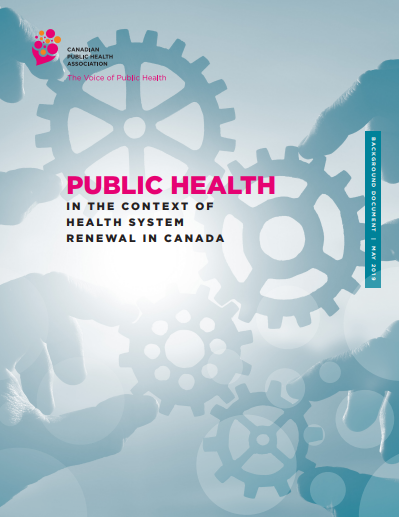
Moving forward in the midst of public health reform
Contributors:
- Charlotte Riordon, BA, BScN, RN, is a recent graduate of St. Francis Xavier University’s Rankin School of Nursing.
- Sionnach Lukeman, MScN, RN, is a PhD student in Nursing at the University of Victoria. She is also an Assistant Professor at St. Francis Xavier University’s Rankin School of Nursing. Her practice background before academia was public health leadership and content expertise in healthy development.
- Christine Johnson, MscAHN, PDt, is Health Equity Lead for the Nova Scotia Health Authority’s Public Health, Science & System Performance. She is also an Adjunct Professor, Department of Human Nutrition, St. Francis Xavier University.
In this blog post, author Charlotte Riordon, a recent graduate of St. Francis Xavier University’s Rankin School of Nursing, discusses the background and findings of her honours research project examining public health reform in Canada.
Over the past decade, the Canadian health system has undergone substantial reform across the country. The restructuring of multiple health authorities into one has occurred in numerous provinces/territories, including the Northwest Territories, Alberta, Quebec, Nova Scotia and Saskatchewan.[1]
For example, the 2015 amalgamation of nine health authorities in Nova Scotia, along with the restructuring of the Nova Scotia Department of Health and Wellness in 2016, involved numerous shifted responsibilities and staffing layoffs. In 2017, the New Brunswick Office of the Chief Medical Officer of Health was completely restructured, including a shift of the Public Health Practice and Population Health Branch to the Department of Social Development. Finally, the tentative (as of 2019) plans to reorganize Ontario’s 35 public health units into 10 regional agencies is another current example of structural changes happening in public health.
Unpacking the issue via rapid review
|
Author Charlotte Riordon, BA, BScN, RN |
To uncover more about the impact of these changes on population health outcomes, I conducted a rapid review to evaluate how the restructuring of public health systems has impacted population health outcomes. My team, which included Sionnach Lukeman and Christine Johnson, sought out Canadian literature published in English between 2010 and 2018 using keywords such as “public health system,” “public health reform” and “population health outcomes.” This search was followed by a review of the international evidence.
Findings of the rapid review
My team’s first observation was that research on how public health system reform impacts population health outcomes is significantly lacking in Canada. Moreover, the available international research is limited and primarily originates in the United States.
From the evidence we did find, three important themes emerged surrounding this topic:
- Increases in public health spending contribute to improved population health outcomes.[2],[3],[4],[5]
- Improvements in public health system organization (e.g., increased staffing, improved infrastructure) lead to better population health outcomes.[2],[6],[7]
- The impact of public health system reform on health equity is often negative.[8],[5]
These findings, although primarily internationally based, are important because they provide context for Canadian public health practitioners for future action and collaboration. We must consider that increased spending on public health and improved public health system organization are associated with positive population health outcomes. Further, we need to question how the continual shifts in public health systems across Canada is impacting health equity.
Next steps
|
Public Health in the Context of Health System Renewal in Canada (2019) |
In the midst of continual public health system renewal in Canada, the Canadian Public Health Association (CPHA) has developed a background document and position statement examining the status of public health. Through these documents, the CPHA provides recommendations for research and development, government organizations and health authorities, as well as public health professionals, such as focusing on assessing return on investment of interventions or incorporating a health-in-all-policies approach.
Public health professionals can support the CPHA and their provincial and territorial public health associations through membership and contributing to position statements when there is a call for feedback. As well, practitioners at all levels can share the findings of this rapid review and highlight the lack of Canadian evidence about the impact of public health reform on population health outcomes.
Provincial and territorial public health associations can also create their own position statements, which are tailored to their unique experiences. By using local examples, practitioners are more likely to find meaning and take action.
With an election year upon us, we have an opportunity to engage with our political leaders and candidates. Let’s take the time to question our candidates about their position on our ever-changing public health system.
Ultimately, research (and funding for that research) is needed to explore how Canada’s changing public health systems have impacted and continue to impact population health outcomes. We encourage researchers to prioritize looking more deeply at the impact of public health reform on population health outcomes and to explore ways in which the public health system can be safeguarded from political changes and restructuring.[6],[9]
Engagement with public health professionals needed
In addition, it will be critical for researchers as well as policy- and decision-makers to engage public health professionals as important stakeholders in the development of organizational frameworks and accountability structures. Current evidence clearly states that public health professionals need support in building capacity to work with other sectors and systems to advocate for appropriately resourced social services to achieve health equity.
This rapid review contributes to the limited evidence on the topic of public health reform in Canada, and will hopefully incite meaningful dialogue among decision-makers and practitioners on critical next steps for advancing public health in Canada.
Photo credit: Clay Banks
References
[1] National Collaborating Centre for Healthy Public Policy (NCCHPP). Structural profile of public health in Canada [Internet]. Montreal: NCCHPP; 2015 [cited 2018 April 22]. Available from: http://www.ncchpp.ca/en/structuralprofile.aspx.
[2] Erwin PC, Greene SB, Mays GP, Ricketts TC, Davis MV. The association of changes in local health department resources with changes in state-level health outcomes. Am J Public Health. 2011;101(4):609-615.
[3] Erwin PC, Mays GP, Riley WJ. Resources that may matter: the impact of local health department expenditures on health status. Public Health Rep. 2012;127:89-95.
[4] Mays GP, Smith SA. Evidence links increases in public health spending to declines in preventable deaths. Health Aff. 2011;30(8):1-9.
[5] Singh SR. Public health spending and population health: a systematic review. Am J Prev Med. 2014;45(5):634-640.
[6] Guyon A, Perreault R. Public health systems under attack in Canada: evidence on public health system performance challenges arbitrary reform. Can J Public Health. 2016;107(3):e326-e329.
[7] Thomson DR, Amoroso C, Atwood S, Bonds MH, Rwabukwisi FC, Drobac P, et al. Impact of a health system strengthening intervention on maternal and child health outputs and outcomes in rural Rwanda 2005-2010. BMJ Glob Health. 2017;3:1-11.
[8] Bambra C, Garthwaite K, Hunter D. All things being equal: does it matter for equity how you organize and pay for health care? A review of the international evidence. Int J Health Serv. 2014;44(3):457-77.
[9] Strosher W, MacDonald M, Hancock T. (2012). Advancing public health systems and services research in Canada: developing a pan-Canadian agenda. Proceedings from the Canadian Public Health Systems and Services Research Think Tank; 2011 May 26-27; Montreal, Quebec. [Place unknown]; 2012. Available at: https://www.uvic.ca/research/groups/cphfri/assets/docs/PHSSR_Think_Tank_report_Final.pdf.

